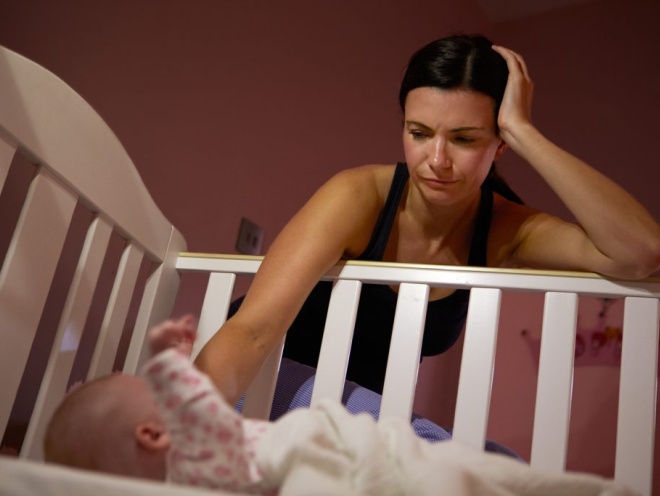We look at sleep training approaches, whether they work and the impact on you and your baby.
A big talking point for many parents is sleep. How much snooze they’re getting and how much their baby’s sleeping. How many times have you been asked ‘Is your baby sleeping through the night?’ Or wondered yourself ‘Should my baby be sleeping through the night?’
Many parents will also question whether there is something they could or should be doing to encourage their baby to sleep longer or better at night (BASIS, no date a).
This is usually when thoughts turn to sleep training. Especially if (well-meaning) friends and family are worrying you with the perils of not sleep training your baby. ‘They’ll never learn to sleep on their own, if you don’t’. ‘You’ll spoil them if you keep rocking/feeding/cuddling them to sleep’.
Do you need to sleep train your baby?
You might start wondering (or worrying) if you have a sleep issue to fix. But remember, babies are not supposed to sleep for very long periods of time. In fact, frequent waking may even help protect your baby against SIDS (Ramirez et al, 2018), which peaks before the age of six months (Lullaby Trust, no date).
We know there are many reasons why babies need to sleep little and often.
If you do want to try sleep training, it’s important to be realistic about how often and why your baby wakes frequently. You could also consider if there are other reasons for frequent night waking, such as reflux or colic.
What is sleep training?
Sleep training is usually split into two groups:
- Methods to treat existing 'sleep problems', which are more commonly known as ‘crying-it-out’ and controlled crying. They’re based on parents not immediately responding to their baby's crying while trying to settle to sleep, or if they wake up at night.
- Methods to prevent 'sleep problems' from developing, such as developing routines to help babies differentiate between night-time as sleep time, and day-time as play/feed-time, for instance.
(BASIS, no date a)
Does sleep training work?
The research on sleep training in the first six months of life is contradictory. One review suggested it can work for most young children (Mindell et al, 2006) but a more recent review found that sleep training does not improve outcomes for mums or babies (Douglas and Hill, 2013).
It is also not known whether sleep training might risk unintended effects on parents and babies (BASIS, no date b). Some parents are concerned that sleep training causes them and their babies undue stress (BASIS, no date b).
There is not much research on the effects of sleep training on babies, beyond the effect on their sleep (or crying). So it's not clear what the long-term effects of leaving babies to cry are (Davis and Kramer, 2021). One study showed that babies following ‘cry it out’ methods of sleep training had raised levels of stress hormones (Middlemiss et al, 2012) but some people have criticised this study (BASIS, no date c).
To sleep train or not?
Like any other decision in parenting, there are different factors to weigh up. Talk to other parents about their experiences and think about what would be best for you and baby.
You could also speak to your health visitor. There may be local sleep support services in your area where you can discuss what options feel comfortable to you.
Baby Sleep Info Source (BASIS). (no date a) Research evidence. Available at: https://www.basisonline.org.uk/sleep-training-research/ [Accessed in 7th November 2021]
Baby Sleep Info Source (BASIS). (no date b) The costs of sleep training. Available at: https://www.basisonline.org.uk/hcp-the-costs-of-sleep-training/ [Accessed 7th November 2021]
Baby Sleep Info Source (BASIS). (no date c) Things to consider - potential costs of sleep training. Available at: https://www.basisonline.org.uk/things-to-consider-potential-costs-of-sl… [Accessed 7th November 2021]
Davis AMB, Kramer RSS. (2021) Commentary: does ‘cry it out’ really have no adverse effects on attachment? Reflections on Bilgin and Wolke (2020). J Child Psychol Psychiatry. 62(12):1488-1490. Available at: https://doi.org/10.1111/jcpp.13390
Hill D. (2013) Behavioural sleep interventions in the first six months of life do not improve outcomes for mothers or infants: a systematic review. Dev Behav Paediatr. 34(7):497-507. Available at: https://doi.org/10.1097/DBP.0b013e31829cafa6
Lullaby Trust. (no date) What is sudden infant death syndrome. Available at: https://www.lullabytrust.org.uk/safer-sleep-advice/what-is-sids/ [Accessed 22nd November 2021]
Middlemiss W, Granger DA, Goldberg WA, Nathans L. (2012) Asynchrony of mother-infant hypothalamic-pituitary-adrenal axis activity following extinction of infant crying responses induced during the transition to sleep. Early Hum Dev. 88(4):227-232. Available at: https://doi.org/10.1016/j.earlhumdev.2011.08.010
Mindell J, Kuhn B, Lewin DS, Meltzer LJ, Sadeh A. (2006) Behavioral treatment of bedtime problems and night wakings in infants and young children. American Academy of Sleep Medicine. Available at: https://www.ncbi.nlm.nih.gov/pubmed/17068979 [Accessed 7th November 2021]
Ramirez JM, Ramirez SC, Anderson TM. (2018) Sudden infant death syndrome, sleep, and the physiology and pathophysiology of the respiratory network. In: SIDS Sudden Infant and Early Childhood Death: The Past, the Present and the Future. Adelaide (AU): University of Adelaide Press; 2018 May. Chapter 27. Available at: https://www.ncbi.nlm.nih.gov/books/NBK513387/ (Accessed 6th December 2021)





